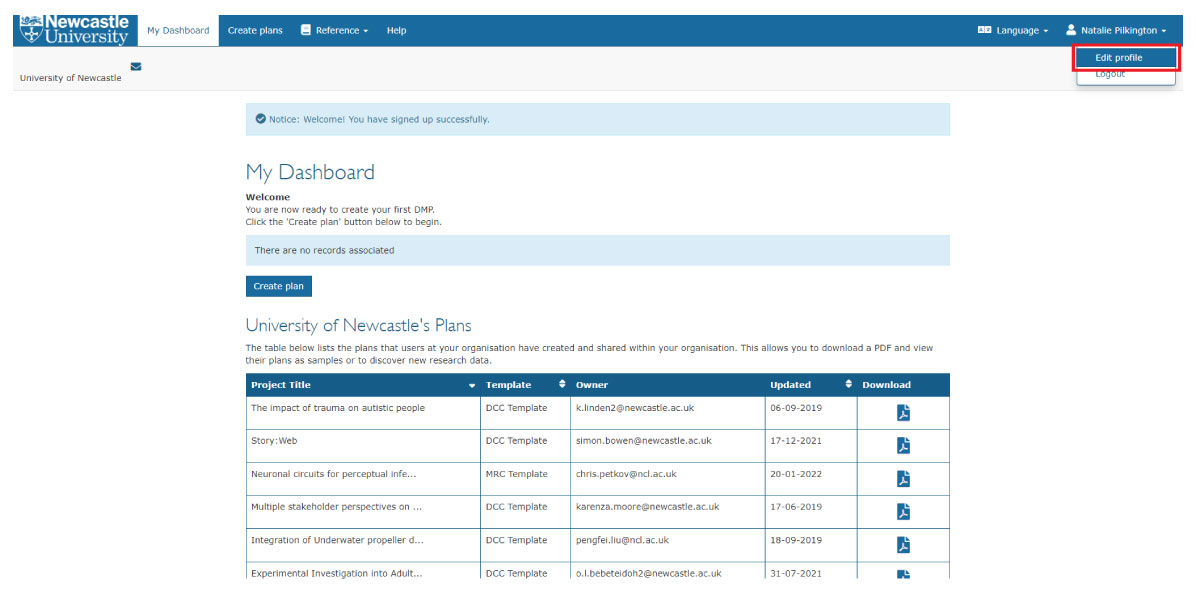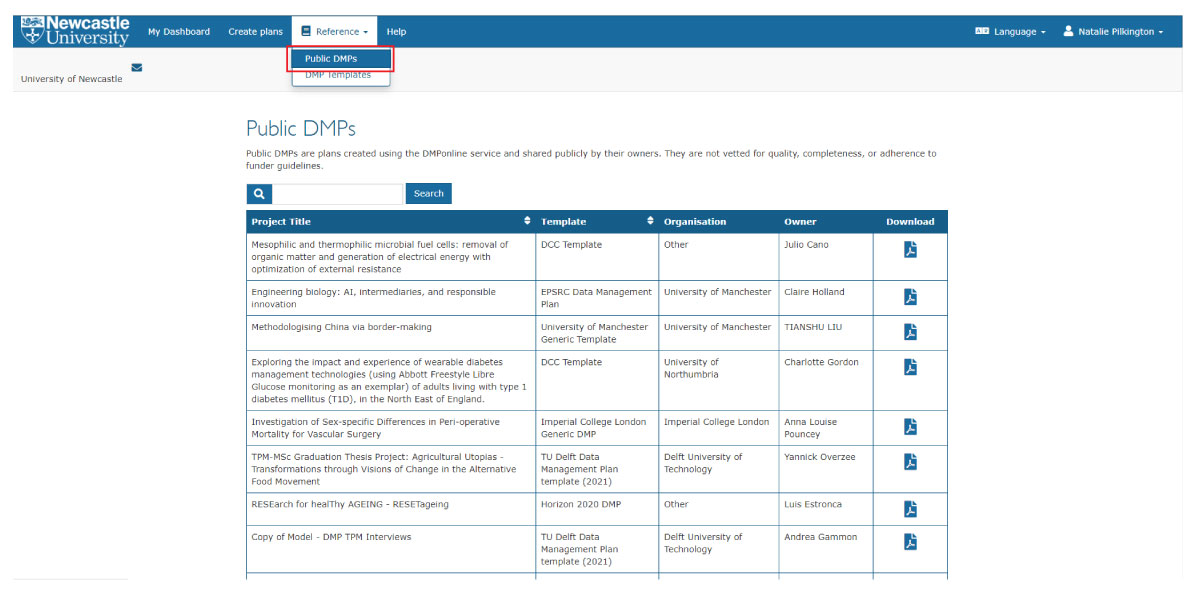Guide to DMPOnline
A data management plan (DMP) describes how research data will be managed throughout the research lifecycle. This includes what research data will be created or collected, how it will be managed during the project, and how it will be shared and preserved at the end of the project. It should typically also describe any potential legal or ethical issues that need to be addressed.
Newcastle University encourages all research proposals to include a DMP, and most research funders require a DMP to be completed as part of the funding application process. All PGRs are required to have a DMP for their project proposal and annual progression.
DMPonline is a web-based tool that can help you write your DMP, and the steps below will guide you through the process of writing your DMP using DMPonline. If you would like to send us your DMP we aim to provide feedback as promptly as possible, subject to demand. Please make us aware of any urgent deadlines that you have.
Create an account
If you already have a DMPonline account, you can skip this step and go straight to My Dashboard.
If you're using DMPOnline for the first time, you will need to sign up for a free account. Go to DMPonline, click on 'Create account' at the top-right corner as shown in the image below.
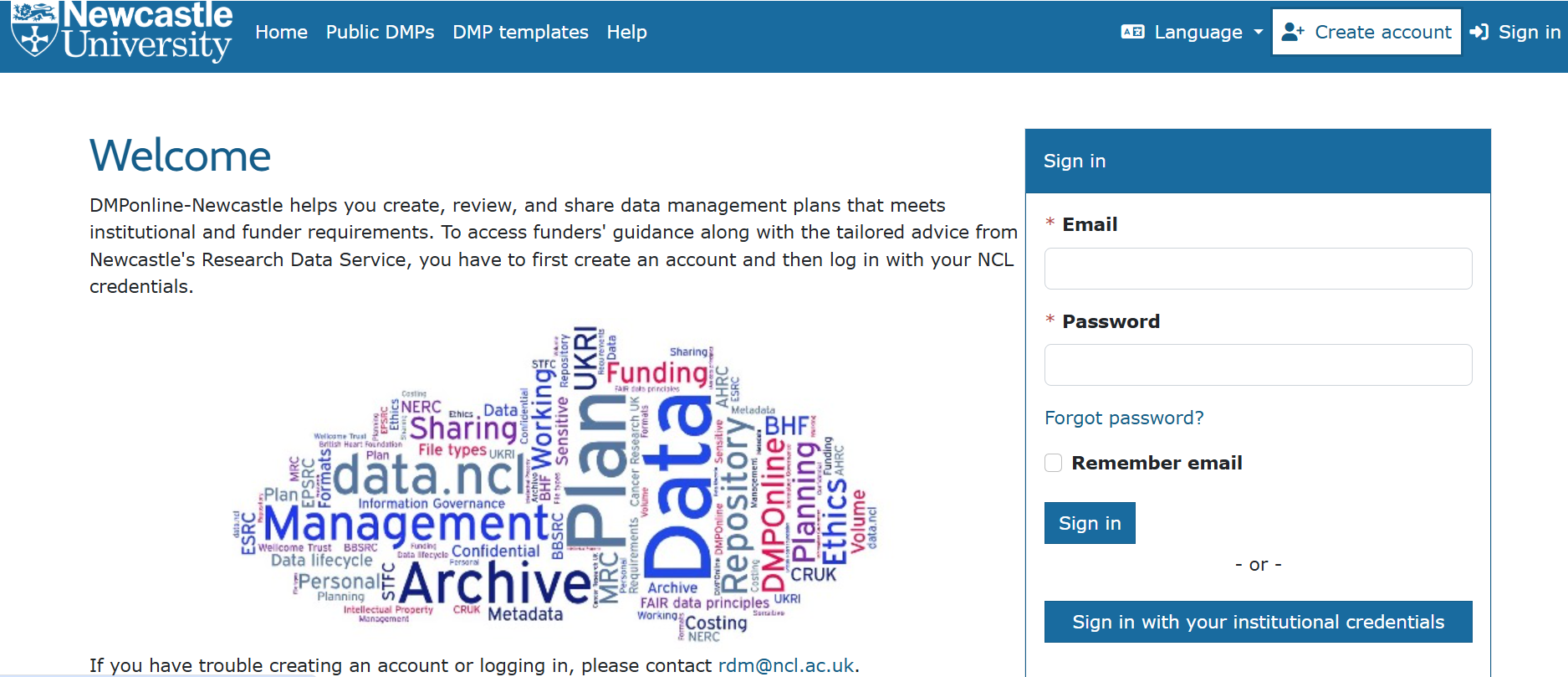
Enter:
- your first name.
- last name.
- your Newcastle University email address. Please remember the exact structure you used for your email address. You should use it consistently, so be aware of variations such as:
- your name, or staff/student ID, or @ncl or @newcastle.
- organisation (be sure to select “Newcastle University”)
- a password.
Tick the box to agree to the terms and conditions and then click the 'Create account' button.
Once registered, you’ll be able to sign in by clicking on “sign in with your institutional credentials” and using your Newcastle university login details. If an error occurs, try to log in with your email and password.
Create a new plan
At the top-right corner of the DMPonline dashboard, click the 'Create plan' button. You should give your plan a title and then select a template as shown in the image below. If you are writing a plan as part of an application for research funding and the funder is listed, you can use their template. Please note that you should always compare the available template to the one provided by the funder on their official website or via the current funding call.
If the funder is not listed, or did not provide you with a template, or your plan is a generic one, you can use the DCC template.
Within each template you have funder-specific guidance (if a funder template is chosen), DCC guidance (with additional questions which you should consider) and Newcastle University guidance (specific to Newcastle University infrastructure).
Writing your plan
Once you have created a DMP as described above, you will be presented with multiple tabs for your DMP. Note that you can also access the DMP directly at any time from your dashboard.
Project Details
This tab contains all of the details about the project, and you can update the information already present and add new information as required.
Contributors
Here you can add all of the contributors and define their roles: Principal Investigator, Data Manager, or Project Administrator. Each contributor can have multiple roles.
Plan Overview
This tab simply provides an overview of the DMP template that is being used and will also include links to relevant funder policies and guidance where available.
Write Plan
This is where you write the DMP. The DMP has been split up into sections, each of which can be expanded to show all of the individual questions. Enter your response to each of the questions in the text box provided, and if you are unsure what to enter, take a look at the guidance available on the right-hand side next to each question. If you are using a funder template, the funder guidance will be displayed by default. There will also be specific University guidance available in the “Newcastle” tab. Next to the “Guidance” tab, there is also a “Comments” tab. Here you can enter any comments or queries that you have relating to the specific question. These comments may be aimed at other collaborators who you have shared the DMP with, or at the University Research Data Service team who you have requested to review the DMP.
Share
The Share tab allows you to set the visibility of the DMP. All DMPs are set to private by default, but you can select a level of visibility that suits you.
This tab also allows you to share your DMP with collaborators. Simply enter the email address of any collaborator you wish to share your DMP with (they do not need to have used DMPonline before), select the appropriate permission, and click “Submit”. You can repeat the process to add multiple collaborators, and once added, it is easy to change the granted permissions, and even remove collaborators if required.
Request Feedback
This tab enables you to request feedback on your DMP from the Research Data Service team. Click on the “Request feedback” button to have a member of the team read through your DMP and provide feedback in the comment box for all of the relevant questions. PGRs are encouraged to request feedback from supervisors.
Download
Once you have finalised your DMP, you can use the Download tab to download a copy. A variety of formats such as .pdf and .docx are available, and you also have the option to include the project details coversheet and supplementary section(s) that are not requested by research funders in the downloaded DMP.
Edit your profile
You can view and edit your profile by clicking on your name on the right-hand side of the top menu bar. In addition to being able to update your account details, you can also link your DMPonline account to your ORCID iD and institutional credentials (i.e., Newcastle’s Single Sign On). Linking your account to the Single Sign On means that the next time you log in you can do so by simply clicking on the “Sign in with your institutional credentials” button You can also update your notification preferences. Be sure to click “Save” to confirm updates to your profile.
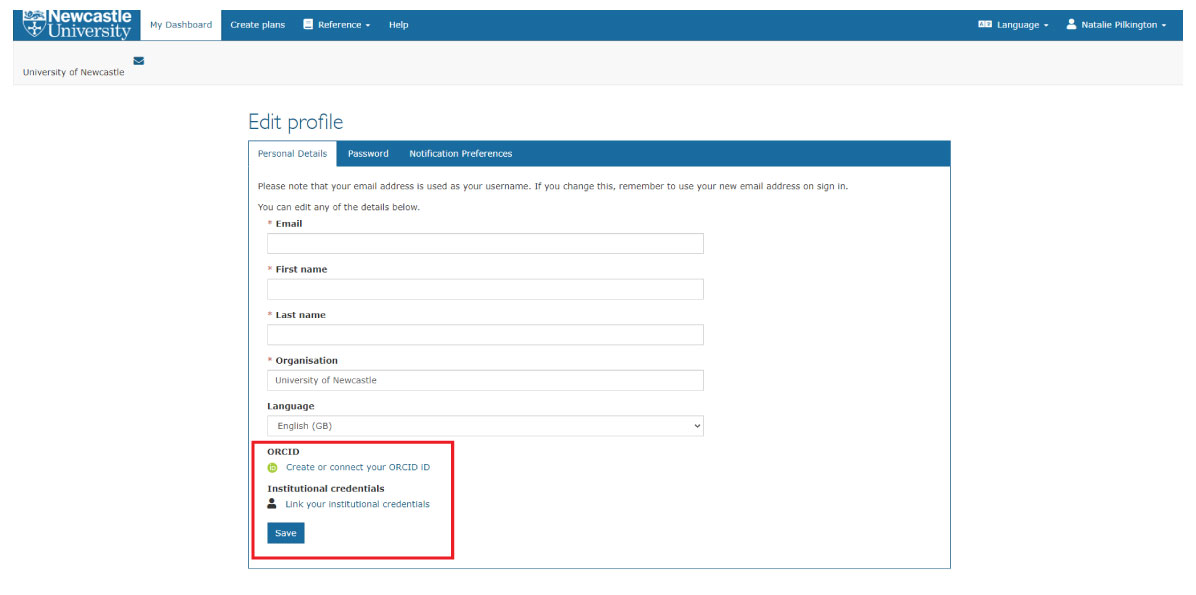
Supervisors
Supervisors should review their PGR’s data management plans to ensure they are feasible and appropriate. A PGR can make supervisors ‘co-owners’ to their plans so you can add comments on each section, ask questions and make suggestions.
To comment on a plan, select it from your DMPonline dashboard and click on the ‘Write Plan’ tab. Each section can be expanded and feedback added using the ‘Comment’ function. The ‘Download’ tab can also be used to download the plan in various formats. 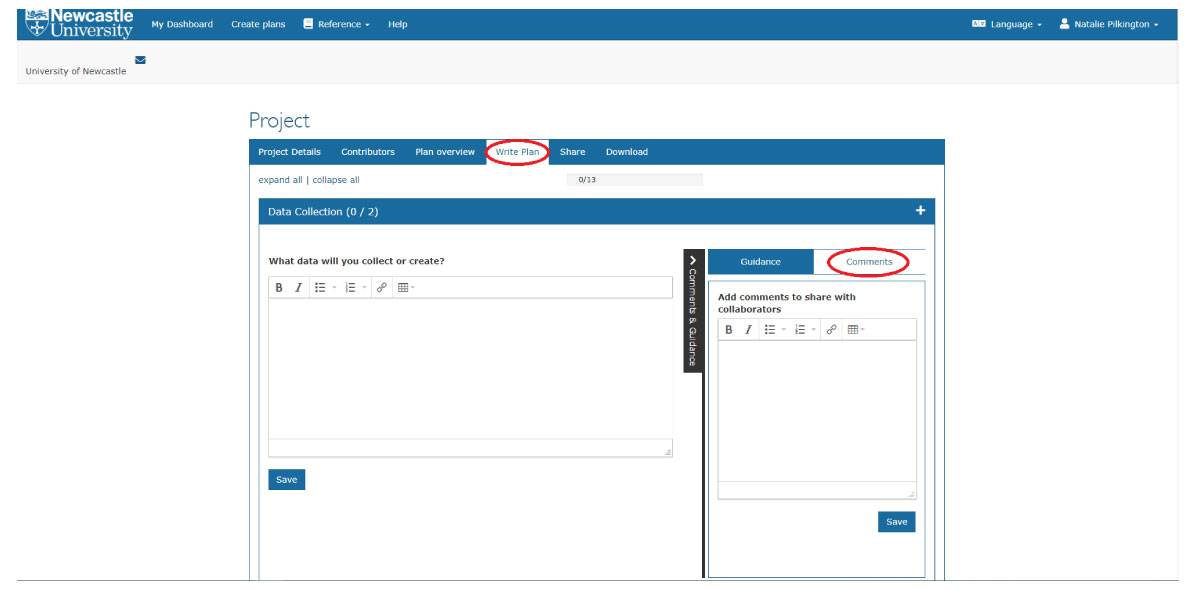
Ongoing Support
The Research Data Service deliver sessions titled 'Introduction to Writing a Data Management Plan' to researcher staff on the Learning Management System and PGR training through each faculty’s training programme, available on https://workshops.ncl.ac.uk/. Advice is available on the wider Research Data Management website and via rdm@ncl.ac.uk.
With thanks to the University of Exeter and the University of Sheffield in supporting the development of this guide.

